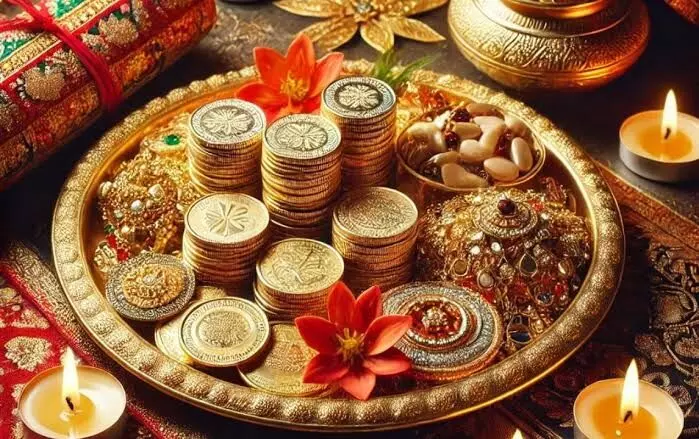`May the smiles never fade’: From Dhanteras to Bhai Dooj, let us say `Shubh Diwali'
The five days of Diwali include Dhanteras, Naraka Chaturdashi (Choti Diwali), Diwali, Govardhan Puja, and Bhai Dooj
By Beyniaz Edulji
Hyderabad: Diwali is one of the major festivals that Hindus celebrate with great pomp. As per the Hindu lunar calendar, it is observed on the 15th day of the month of Kartik which is the darkest night of the year. On this day, Hindus decorate their homes with diyas, rangoli, and twinkling lights.
The celebrations last five days, each dedicated to a different festival. Diwali celebrated over five days, is much more than a festival – it's a celebration of light triumphing over darkness, good over evil, and knowledge over ignorance.
Rooted in traditions, Deepawali carries profound spiritual significance. The word ‘Deepawali’ means ‘a row of lights’ and its observance revolves around illuminating homes and surroundings to invite happiness and prosperity.
The five days of Diwali include Dhanteras, Naraka Chaturdashi (Choti Diwali), Diwali, Govardhan Puja, and Bhai Dooj. Each day of the Diwali celebration has its rituals and significance.
Dhanteras
This day marks the beginning of Diwali festivities this year on October 29. On this auspicious day, people clean and decorate their homes, believing it invites Goddess Lakshmi’s blessings. They also purchase precious metals like gold, silver, or new utensils. It is believed that doing so attracts good fortune and wealth. People worship Goddess Lakshmi and Lord Kubera on this day and pray for prosperity and wealth. On the day of Dhantrayodashi, Goddess Lakshmi came out of the ocean during the churning of the Milky Sea. Hence, Goddess Lakshmi, along with Lord Kubera who is the God of wealth, is worshipped on this day.
Naraka Chaturdashi or Choti Diwali
The day before Diwali is known as Naraka Chaturdashi. It commemorates the victory of good over evil. Choti Diwali, or Naraka Chaturdashi is celebrated on the second day. It honors Lord Krishna's triumph over the demon Narakasura during the Dvapara Yuga, leading to the liberation of 16,000 captive girls. On the second day of Diwali, people commemorate Lord Krishna's victory over the demon Narakasura. It symbolizes the triumph of good over evil. To mark this occasion, houses are thoroughly cleaned and decorated as a way to purify the home and invite positive energies. Earthen lamps are lit to dispel the darkness of evil and negativity, filling the surroundings with light and warmth. In many regions of India, this day is also celebrated with the bursting of crackers, adding a festive and joyous atmosphere. The fireworks symbolize the banishing of evil forces and the arrival of prosperity and happiness. This day, often called Naraka Chaturdashi, is an integral part of the Diwali festivities, reflecting themes of cleansing, renewal, and victory.
Diwali
Diwali marks Lord Rama, Goddess Sita, Lord Lakshman, and Lord Hanuman's return to Ayodhya after defeating the demon king Ravana. This victory symbolizes the importance of adhering to dharma (duty) in daily life. It also celebrates the victory of good over evil. On this day, people decorate their homes with diyas, colorful rangoli, and lights. Devotees also perform Lakshmi and Ganesh Puja in the evening. Diwali is associated with Goddess Lakshmi, the deity of wealth and prosperity, and Lord Ganesh. It is believed that worshipping them on this day brings abundance and good fortune for the year ahead. Diwali holds great religious significance across India, deeply rooted in various traditions and legends. One prominent connection is to the Hindu epic Ramayana.
Govardhan Puja
Indians celebrate Govardhan Puja the day after Diwali.
The fourth day of Diwali is devoted to Lord Krishna and is celebrated with the ritual of Govardhan Puja. This day holds great importance as it commemorates the event when Lord Krishna lifted the Govardhan Mountain on his little finger to protect the people of Vrindavan from the wrath of torrential rains, unleashed by Lord Indra. Through this act, Lord Krishna protected nature and mankind. In honor of this divine intervention, devotees prepare a variety of delicious dishes in a ritual known as Annakut meaning ‘mountain of food’. A wide assortment of sweets, savories, and traditional dishes are lovingly cooked and offered to Lord Krishna, symbolizing gratitude for his blessings and the abundance of nature’s bounty. These offerings are arranged to resemble a hill, signifying the Govardhan Mountain, and are later shared as Prasad among family and community members.
Bhai Dooj
The last day of Diwali festivities is celebrated as Bhai Dooj, Bhau Beej, or Bhaiya Dooj. The fifth and final day of the Diwali festival is celebrated as Bhai Dooj, a day that honors the sacred bond between brothers and sisters. This festival is similar to Raksha Bandhan in its essence, as it focuses on the deep love and care between siblings. On this auspicious day, sisters perform a special ritual by applying a ‘tilak’ on their brothers’ forehead, praying for their long life, well-being, and prosperity. In return, brothers vow to protect their sisters from harm and adversity, symbolizing the lifelong promise of support and care.
Diwali is also linked to Goddess Lakshmi, the goddess of wealth and prosperity, whose birth is celebrated at the festival’s onset. The night of Diwali marks her marriage to Vishnu. Alongside Lakshmi, Ganesha, the remover of obstacles, is venerated. In eastern India, the festival is associated with Goddess Kali, representing the victory of good over evil. In the Braj region and parts of Southern India; the festival is celebrated to mark Lord Krishna's defeat of Narakasura. Merchants often pray to Saraswati and Kubera for blessings in music, literature, and wealth management. In some states like Gujarat, Diwali signifies the start of the New Year.
Though mythical tales differ by region and within Hindu traditions, they share common themes of righteousness and the pursuit of knowledge as a means to conquer ignorance and darkness, reflecting the general belief in the ultimate triumph of good over evil.